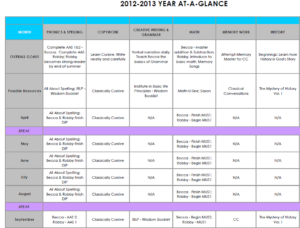It’s that time of the year – everyone is busy planning what to do next year for their studies….
Can I share a secret with you? I started planning in February. Not because I was worrying about what to do, or because I didn’t like what we studied this year (loved it!), but because I am one of those people – a planner. In fact, I might be the only person that has had a complete stranger tell her he had a message from God and part of it went something like this: “You always like to be prepared, but there are things up ahead you won’t be prepared for without me (paraphrase)”. Ok, so now you know. I plan things.
Now I know everyone has great plans for their school year, and some get it done and others end up somewhere in Africa when they were shooting for Australia. So I decided to share with you a planning method that I think works pretty well. It is specific enough to assess progress and stay on track, but flexible enough to allow me to chase the kids at the zoo, or the museum, or take them swimming for the day when the opportunity arises.
Here is the method to my madness (and later I’ll ask you to share yours!):
I first created a spreadsheet with all the topics I wanted to cover across the top. (I ended up listing over 20 subjects from math to projects, and copywork to read-alouds – don’t worry – we won’t be doing all of them all of the time!).

On the left-hand side, the first row in the table was for the objectives of that study – quantifying and clarifying my goals for the student I had that are to cover that topic, or for us as a family depending on the subject. Schedule making hint #1 – if you don’t write it down, it probably won’t get done.
The second row was used for possible resources. After I figured out what subjects I wanted to or needed to cover, and identified my general goals in that subject, I started looking at resources that would fit those needs. If I found something I liked, I listed it in the second row for that particular subject. At the beginning, I had a number of possible resources. As I worked further down the rest of the schedule, it became more obvious which resources would fit best, and I just kept narrowing down the resources I had been considering until I found the one I needed. Schedule making hint #2 – Don’t pick a resource because everyone else is doing it. Pick what works best for the number of students you are juggling, the type of teacher you are, and the information you want to cover.
For the remaining rows in my chart, I added the months of the school year that I was planning. We have decided to school year-round, taking it a little lighter in the summer and changing up our topics, but still educating year round, so you can see I started my schedule in April, and took it through April of 2013. You might choose to start your schedule in August or September. Once I knew what I wanted to accomplish from a knowledge and activity standpoint, and I had my months laid out, I just had to write the resource we would use and which months each resource would be used. I checked some of the resources to see how long a lesson was, and how many were suggested in a week. Then I figured how long it would take us to work through the resource, writing the name of the resource into the month that we would be using it. Once the schedule was full, if I still had resources I would love to use, but did not have room in the schedule, I added a row at the bottom for “If we have time”. That way, if we move quickly through a subject, we can cover those additional items. Schedule making hint #3 – start with the big picture, and work backwards. First the year, then the months, and lastly the weeks (you will NOT find me scheduling subject content down to the day! – Although, we do have a daily schedule of activities – perhaps a post on our daily schedule someday…. :).
Once you lay out your year in this format, you will love being able to gauge where you are throughout the year just by a glance! If you desire, you can stop here, and figure that is enough planning, or you can schedule out your weeks. I like to break each month down by four weeks, and schedule field trips, unusual science experiments, unusual projects, gardening, unusual crafts, etc. If I schedule them, I am much more likely to get them done!
This year, one of Charlotte Mason’s philosophies that has worked really well for our family is the concept of limiting studies of each subject to 15 minutes. That means, wherever we are at in our study when the 15 minute timer goes off, we stop and come back to the next day. It may sound counter-intuitive, but my kids accomplish way more in consistent 15 minutes sections than if they had an hour on a subject. It helps them to develop a habit of attentiveness, never working past the point of focus. As they get older, I will begin to lengthen these sessions, but for now they work great. I can give the kids 2 math sheets and tell them to finish them. 30 minutes later, they will still be sitting at the table working on the back of the first page. If instead I hand them 2 worksheets, set the timer for 15 minutes, and move on to the next assignment when the buzzer goes off, within days they are quickly working through both sheets – and sometimes with time to spare! If you don’t believe me, try it out yourself. If they finish with time to spare, they get to color or play quietly until the timer buzzes, then we all move on to the next subject. Love it!
So since we move through subjects based on timeframes, it is silly for me to make a schedule that specifically lists which lesson to do which day. We just pick up where we left off. If we have time for 3 spelling lessons in 15 minutes because my daughter knows the info, we do three. If we only get through half of the science lesson, we do the other half the next day. This works well for us. It might work better for you to have a weekly plan, and I say go for it! Now that you have your monthly plan, it should be fairly easy to schedule your week. Just figure out how many lessons you have to do in a week to finish the resource in the months you allotted for it. If it seems like too much, go back and spread it over more months.
If you are in the midst of planning, and would love to have the excel file with the grid already set up, just click here to open it, then save it to your computer.
What are some things you have found work great for planning your homeschool year? How about specifically planning for Classical Conversations? What is the best thing you did this year as far as scheduling goes and why? I’d love to hear from you!
Bringing glory to His name, the source of true Wisdom and Righteousness,
~Karen

Thanks so much for this great planning post!!
Karen, I so love reading your blog. You are full of practical suggestions and funny stories. We are finishing up our 14th year of homeschooling and I love that I’m still growing and learning. Your blog is a huge blessing and so are your lapbooks!
Karen, I take my hat off to you! Your planning tips and grid are a God-send to me. I am in year two of home educating our three children and am about to try your planning grid out. Thank you!
I used to teach school and planning was the most fun. In homeschooling, though, I find myself getting stuck when I try to plan down to the day. I like your suggestion to start big (year, month, week) and let the days work themselves out by what we accomplish the day before within that planned week. I have a 5-yr-old (almost 6) and a 3-yr-old, so this year is our ease-into-it year! 🙂 We are loving CC where I am my daughter's tutor!
Lets go back to the 15 minute thing…
Do you tell them they HAVE to finnish the assignment in 15 minutes or just say "See how much you can get done in 15 minutes", because I have three little boys that unless they have a list of assignments they have to complete for the day will sit and stare at the wall to pass the time if they know they're done in a certain number of minutes.
Do you play a game with it, "See if you can beat the clock"…
I also school year around and would love to try this, like tomorrow, lol!
Karen thank you so much for your awesome insight on homeschooling! I'm really excited about learning more about CC and reading your posts has sparked my interest even more!!
I just found this site today, looking for catechism copywork. Thanks!! but I would love to see this excel worksheet too and the link doesn’t work. Has it moved? Thanks for any help; looking forward to looking around here—
Hi Betsy! I have updated the link so it should work for you!
Blessings,
Karen
Thank you Karen!! It is similar to my planning spreadsheet, but i love some of the rows you have added. Very helpful—-